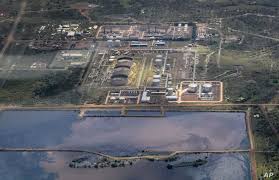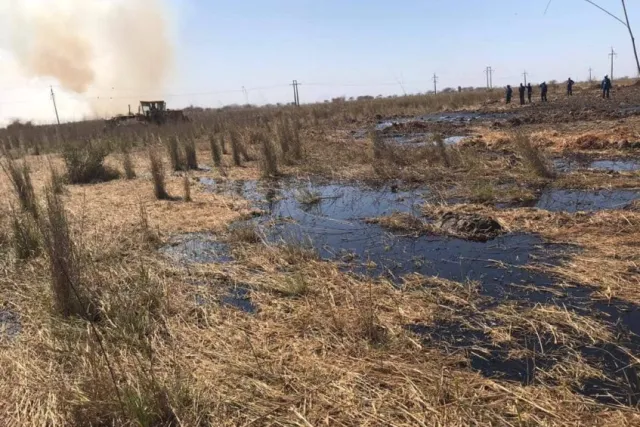The oil industry in South Sudan has not only failed to bring about the anticipated economic prosperity and development, but has also left a trail of environmental destruction in its wake.
Although oil was discovered in the 1970s in the Southern parts of Sudan (Upper Nile and Unity state), Sudan became an oil-producing state in the 1990s, making oil instantly become the main source of income for both the North and Southern parts of the Sudan.
The Upper Nile region, one of the biggest oil-producing regions in South Sudan with more than 7 oil fields, comprises different communities and is characterized by its enormous natural resources like oil, flora, and fauna as well as the Sudd wetlands amongst others. This region has been a focal point of oil extraction activities for decades.
‘We are aware of environmental pollution in Upper Nile State but we are yet to determine to what extent it has degraded and been polluted. There are environmental audits that are currently ongoing in Upper Nile State, particularly in areas where oil extraction is ongoing like Melut, Paloch, and Adar Yale amongst others’-Honorable Joseph Africano
The process of oil exploration, development, and production has been characterized by the generation of hazardous waste that has adverse effects on humans and the environment.
Oil pollution
Decades of oil drilling in the region have resulted in severe degradation and pollution of air, land, water and the environment – significantly impacting the ecosystem and the residents who depend on it for livelihood. Despite the potential economic benefits of oil extraction, the region has experienced a range of negative consequences, with the environment bearing the heaviest burden.
One of the most significant environmental impacts of oil extraction in the Upper Nile region is the pollution of water sources, which has widespread consequences. The oil industry’s activities have led to the contamination of water bodies, making the water unsuitable for drinking, irrigation, or supporting aquatic life.
According to the Sudd Institute, studies on water in the oil-producing areas of South Sudan show high concentrations of salt and heavy metals resulting from oil exploration, development, and production.

Nyanliet Majok (not real name) of Melut County of Upper Nile State who prefers anonymity says the most important thing in human life is water and food. He highlights how their land has been destroyed by oil extraction and how many NGOs have come in the past to assess the level of pollution and degradation but “that’s as far as it gets and nothing has been done.”
According to the United Nations Committee on Economics, Social and Cultural Rights adaptation on Comment No.15 on the right to water, Article 1 states that the human right to water is indispensable for leading a life with human dignity. It is a prerequisite for the realization of other human rights. Comment No.15 also defines the right to water as a right of everyone to sufficient, safe, acceptable physically accessible, and affordable water for personal and domestic uses.”
Reports indicate that both the government and oil companies have long been aware of the contamination caused by drilling activities, yet little has been done to address these issues, leaving local communities vulnerable to the harmful effects of polluted water sources. This pattern of neglect and disregard for environmental concerns raises serious questions about the sustainability of oil extraction in the region and its long-term impact on both the environment and the local population.
Mijak Majok (real name withheld) a traditional leader in Melut county dives into the extent to which water pollution has reached in Upper Nile stating that the produced water in Mujama is a ticking time bomb and if it ever floods, all the water will burst and flow into the river killing everyone in Melut and Adar Yale.
German development organization has for years warned about the long-term effects of oil exploration and production that come with a heavy price for the people living in and around the oil field.
“We are talking about an oil catastrophe in South Sudan that affects about 600,000 people, all these people living in and around three oil fields in the country’s north. This number corresponds to about 5% of the entire population of South Sudan,” says the organization’s Vice Chairman, Klaus Stieglitz in an interview with DW.
Weak enforcement of laws
The weak enforcement of the Petroleum Act of 2012 has allowed multinational oil corporations to compromise the welfare of communities and their environment.
Oil corporations often don’t comply with environmental regulations for cost reasons. They can only comply when forced to do so by the authorities which is rarely or not the case at all with the regulating institutions/bodies in South Sudan.
Honorable Joseph Africano, the undersecretary for the Ministry of Environment and Forestry said, “We are aware of environmental pollution in Upper Nile State but we are yet to determine to what extent it has degraded and been polluted. There are environmental audits that are currently ongoing in Upper Nile State, particularly in areas where oil extraction is ongoing like Melut, Paloch, and Adar Yale amongst others,” he explains, adding that “It is until then that we can ascertain the extent to which the environment in this region has degraded.”
He further elucidates that oil companies are supposed to conduct annual environmental audits which they have not been adhering to and it is after this ongoing audit that they will be able to know how these companies have been performing and ensure that those that won’t comply with international environmental standards will be stopped from operations altogether in the country.

Additionally, oil extraction activities in this region have also contributed to deforestation and habitat destruction, further exacerbating the environmental degradation in the area. The clearing of land for oil drilling, construction of infrastructure, and other related activities have led to the loss of critical habitats for various species, disrupting ecosystems and threatening biodiversity.
Furthermore, the impact on wildlife and biodiversity in the region has been significant, with reports highlighting the negative consequences of oil-related activities on the local flora and fauna. The destruction of habitats and ecosystems not only affects the environment but also has implications for the long-term sustainability of the region’s ecological balance, posing challenges for conservation efforts and the well-being of both wildlife and local communities alike.
Community outcry
Gueer Deng(real name withheld) from Melut County alleges that the government is not protecting her people saying that there’s no land for the animals to graze or drink water from and there’s no unpolluted land for the people to cultivate in. He proceeds to talk about how the government and oil companies seem to prioritize money over the well-being and livelihoods of their people.
The outcries from the communities in this region further put clarity on the dire and vulnerable situation that they are facing as a result of negligence from oil companies and the government on the negative impacts that oil exploration and production has on the environment and health of these community members. Moreover, the creation of oil infrastructure has further exacerbated the situation, leading to the destruction of natural and vital resources essential for the sustenance of these communities.
A study conducted by Dar Petroleum to assess the chemical contamination in its oil fields and surrounding areas in November 2018 showed that some waste pit liners had been compromised and that flooding had allowed some chemicals to seep out of the soil of the field areas. The report recommended a 5-year clean-up which was estimated to cost approximately 58 million US Dollars.
However, the communities say nothing has been done up until now stating that neither the oil companies nor government has been able to adhere to this or do anything.
The South Sudan Minister for Investment, Dr. Dhieu Mathok in an interview with BNN Bloomberg earlier in September said, “Oil companies operating in the country including the outgoing subsidiary of the Malaysian oil and gas giant Petroliam Nasional Bhd should restore the environment after years of widespread environmental degradation.”
Petronas Carigali Nile Limited (PCNL) announced in August 2024 that it was withdrawing from South Sudan as part of its long-term investment plan after operating in the country for over 14 years. The energy firm said the decision was made following two years of divestment initiatives which started in the same year (2022) that South Sudan launched its environmental audit on oil companies.
“There are a lot of issues around the withdrawal of Petronas that have to be addressed because this is one of the challenges between the government and the investment companies,” said Dr. Dhieu Mathok.
Aisha Abdel Salam, an MP representing Melut County of Upper Nile State in the Transitional National Legislative Assembly raised her concerns about the pollution in parliament during one of the sessions.
“My concern is the issue of Petronas leaving the country before the results of the environmental audit are out. Who will be responsible for the affected communities especially in places like Melut, Unity, and Pariang once the environmental audit results are released?” Aisha Abdel Salam asked during a Parliamentary sitting in August.
The environmental impacts of oil extraction in the Upper Nile region are clear and concerning. Despite the economic benefits that come with the industry, the toll it takes on the environment cannot be ignored. From deforestation and habitat destruction to water pollution and air contamination, the negative effects of oil extraction are far-reaching.
The rich biodiversity of the region is under threat, with delicate ecosystems being permanently altered. The people living in the area also suffer as their water sources become polluted, their land is degraded, and their health is compromised.
It is evident that oil extraction is a curse in disguise to the environment of the Upper Nile region. The short-term gains are outweighed by the long-term consequences, and the price being paid is too high. It is crucial that action is taken to mitigate these impacts, whether through stricter regulations, the implementation of sustainable practices, or a shift towards renewable energy sources.
The protection of the environment and the well-being of both present and future generations must be prioritized. Only by acknowledging the true cost of oil extraction and taking proactive steps to address it can there be hope to preserve the natural beauty and resources of the Upper Nile region for years to come.
At the time of publishing this story, the Ministry of Petroleum and Mining had not commented- after two months of reaching out to them.
Report compiled by our reporter in Juba, South Sudan
